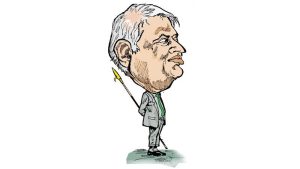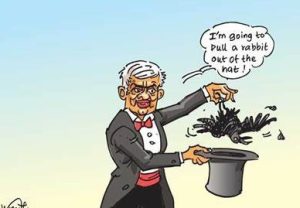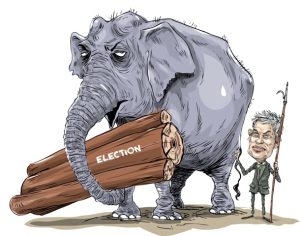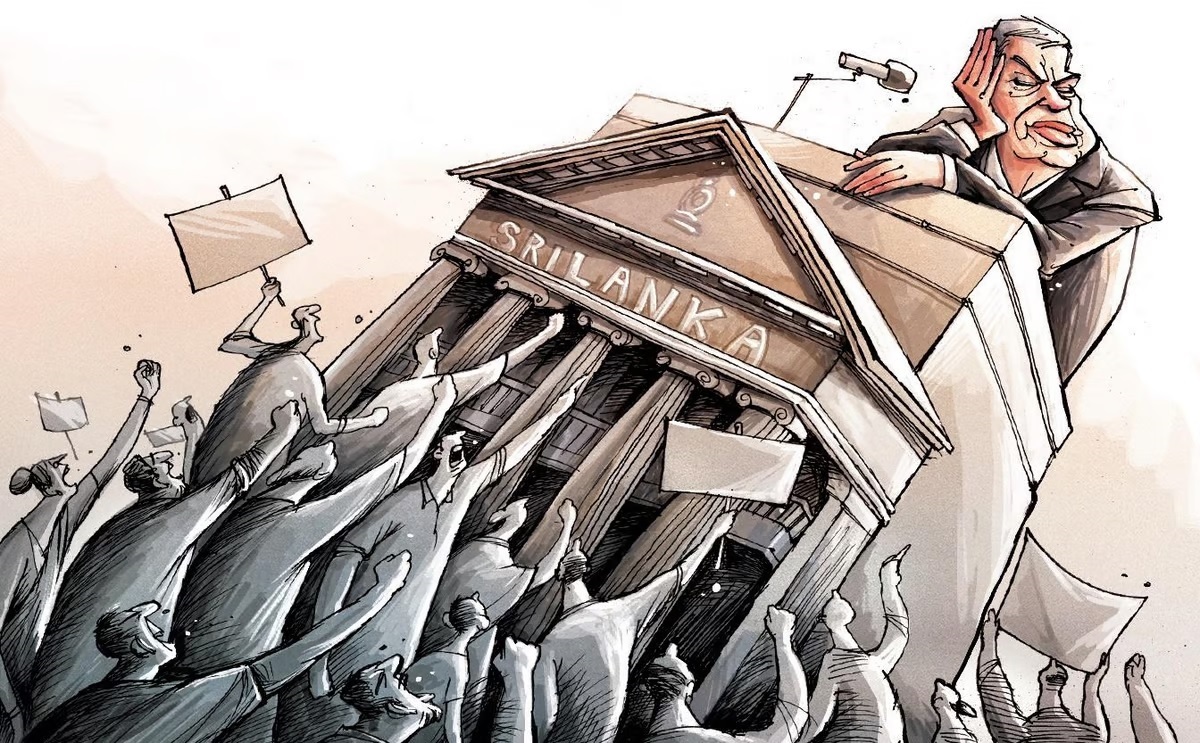Consternation reigns in Sri Lanka following President Ranil Wickremesinghe’s directive to gazette an inconsequential draft 22nd Amendment to the Constitution. points out human Rights activist Kishali Pinto Jayawardhana in her weekly coloum to the Sunday times.
Critics denounce this move as a transparent political ruse to delay the highly anticipated presidential elections, for which a date is to be declared ‘soon’ by a jittery Elections Commission.

‘Spurious’ Presidential Apologies
This week, the President was in unnervingly fine fettle, first lambasting the judiciary for ‘interfering’ with the executive power of the people to a befuddled audience of village communities during the distribution of ‘Urumaya’ freehold land deeds in Mahiyanganaya. Soon after, he assured the public during the opening of a new courts complex in Beligaha, Galle, that they need not ‘fear’ the proposed 22nd Amendment or lament that this would be the end of democracy in Sri Lanka.
He claimed this amendment merely corrects the constitutional text so that Article 83(b) of the Constitution aligns with the 19th Amendment’s limitation of the President’s and Parliament’s terms to five years. This revision had been overlooked by the 19th Amendment’s drafters due to an ‘oversight,’ he said, even labeling the lawyer who drafted the 19th Amendment as ‘inexperienced.’ This was followed by a spurious ‘apology’ to the people for the bad choice.
Sri Lankans generally take these ‘apologies,’ whether from Presidents or ex-Chief Justices, with more than a pinch of salt, often with a strong whiff of contempt. Distastefully, the President has developed a habit of blaming others for his administration’s faults. Previously, he blamed his pet anti-corruption lawyers for flawed prosecutions during 2015-2019. Now he blames an ‘inexperienced’ lawyer for an ‘omission’ in the 19th Amendment, despite it being well known that this constitutional drafting exercise was conducted by a few, carefully selected for their readiness to obey him.
Blaming the Judiciary for Government Failures
This ‘blame game’ seems to be escalating. For example, in Mahiyanganaya, the President asserted that handing out deeds to villagers had been halted during his government in 2002-2003 due to a ‘court decision.’ He implied that if the program had been implemented 20 years ago, the people of Sri Lanka could have been granted free land rights earlier, effectively blaming the judiciary for delaying land rights.
However, this statement is a grievous misrepresentation of the ‘court decision’ in question. As a member of the legal team that petitioned the Supreme Court at the time, I must clarify the facts to set the record straight. This is crucial as the President’s habit of subverting facts for ad hoc and ad hominem attacks must be halted, regardless of the political purpose.
The judiciary does not have a public platform to defend themselves, and the President’s relentless criticism of the judiciary’s ‘interference’ with the executive and legislature has become tiresome. This actually inhibits proper critique of the judiciary by citizens, which is necessary for the greater democratic good of the country.

Context of the Court Decision on the Lands Bill (2003)
The President referred to the “Lands Ownership” Bill (November 2003), which his government proposed to Parliament for laudable purposes. The Bill was challenged in the Supreme Court due to the government’s failure to adhere to constitutional procedures. The Court’s decision was based on non-adherence to these procedures, not on the substantive question of granting outright title to land grantees.
The Bill aimed to provide for the disposal of state lands to citizens and remove restrictions on land grants. However, it was successfully challenged because it was not first referred to every Provincial Council as required. The Bill was found inconsistent with Article 154(g)3 of the Constitution, which mandates that state land disposition within a province must be advised by the relevant Provincial Council.
President’s Powers in Regard to Land Also an Issue
The Bill was withdrawn from Parliament following the Court’s determination. Ironically, the President’s current admonishment of the judiciary not to infringe on his ‘authority’ overlooks the fact that a significant challenge to the 2003 Lands Bill concerned his own powers. The Bill unconstitutionally interfered with the President’s power to make land grants, requiring a two-thirds majority in Parliament and a Referendum.

Courting ‘Blood on the Streets’?
The current controversy over the proposed 22nd Amendment leaves much to be desired. Revising Article 83(b) is not an urgent constitutional imperative. Critics argue that amending Article 83(b) requires a two-thirds majority in Parliament and a Referendum, potentially disrupting the electoral map and delaying both presidential and parliamentary elections.
If President Wickremesinghe intends to subvert the Constitution to eliminate fundamental democratic electoral choices, there will undoubtedly be severe repercussions.







